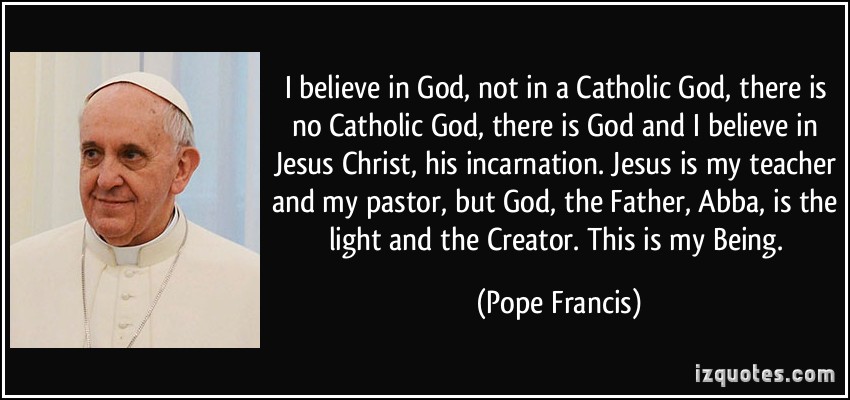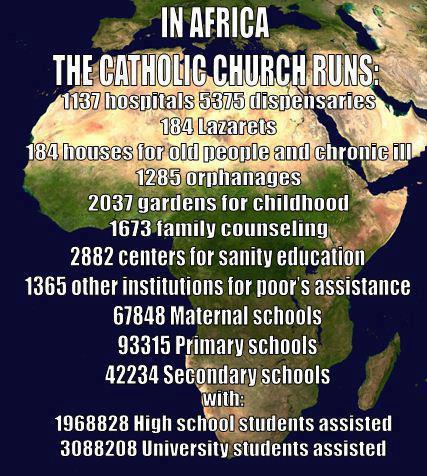One thing is clear about the Catholic church: it cannot trace its roots back to Jesus.
Revelation 12:17 KJV says the end times "remnant" church will "keep the commandments of God". Since it is the "remnant" church, it must be identical to the church Jesus in the beginning. The Catholic church by its own admission professes to keep different commandments that those of Jesus, which they claim authority to establish...therefore, since the Catholic church does not keep the commandments Jesus gave His church, it's cannot be the end time church which can trace its roots to Jesus.
what commandments?
there must be more to fundamentalists than protests, accusations, and the triple curse of pride, presumption, and arrogance!
Prophecy of the new covenant and given to a nation bringing forth the fruits thereof. (The new covenant church) Jn 15:1-5
Dan 2: 44 And in the days of these kings (Roman Caesars) shall the God of heaven set up a kingdom, which shall never be destroyed: and the kingdom shall not be left to other people, but it shall break in pieces and consume all these kingdoms, and it shall stand for ever.
Isaiah 2:2
And it shall come to pass in the last days, that the mountain of the Lord's house shall be established in the top of the mountains, and shall be exalted above the hills; and all nations shall flow unto it.
Micah 4:1
But in the last days it shall come to pass, that the mountain of the house of the Lord shall be established in the top of the mountains, and it shall be exalted above the hills; and people shall flow unto it.
Daniel 7:18
But the saints of the most High shall take the kingdom, and possess the kingdom for ever, even for ever and ever.
Rev 21: 10 And he carried me away in the spirit to a great and high mountain, and shewed me that great city, the holy Jerusalem, descending out of heaven from God,
11 Having the glory of God: and her light was like unto a stone most precious, even like a jasper stone, clear as crystal;
Lk 1:32 He shall be great, and shall be called the Son of the Highest: and the Lord God shall give unto him the throne of his father David:
33 And he shall reign over the house of Jacob for ever; and of his kingdom there shall be no end.
Lk 22:29 And I appoint unto you a kingdom, as my Father hath appointed unto me;
Heb 12:22 But ye are come unto mount Sion, and unto the city of the living God, the heavenly Jerusalem, and to an innumerable company of angels,
23 To the general assembly and church of the firstborn, which are written in heaven, and to God the Judge of all, and to the spirits of just men made perfect,
28 Wherefore we receiving a kingdom which cannot be moved, let us have grace, whereby we may serve God acceptably with reverence and godly fear:
Matthew 5:14
Ye are the light of the world. A city that is set on an hill cannot be hid.
Matt 21:43 taken from Israel given to Peter and the apostles Matt 16:18-19 18:18 Jn 20:21 eph 2:20
1 Peter 4:11
If any man speak, let him speak as the oracles of God; if any man minister, let him do it as of the ability which God giveth: that God in all things may be glorified through Jesus Christ, to whom be praise and dominion for ever and ever. Amen.
Jude 1:8
Likewise also these filthy dreamers defile the flesh, despise dominion, and speak evil of dignities.
Jude 1:25
To the only wise God our Saviour, be glory and majesty, dominion and power, both now and ever. Amen.
Christ is king and has all authority and dominion!
Christ appointed Peter, the apostles, and their successors to govern the church and administer the kingdom until He returns in glory!
Submission and obedience to them is submission and obedience to Christ!
Like Joseph under pharaoh the king and his brothers bowed in obedience to Him as God willed!
But Protestant fundamentalists will not, for satan the first Protestant was in rebellion against God saying: I will not serve! I will not obey!
So who is you’re leader?
All those who submit and obey are Christ’s!
Those who do not are satan’s!





 sskirche door.
sskirche door.